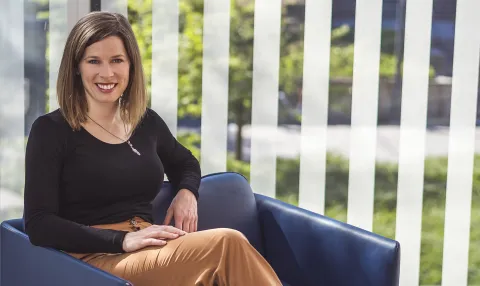"Where I once felt lost trying to participate when at Canadian Olympic Committee and their Athletes’ Commission meetings, I am finding my planning lens brings a different perspective that is important to express. "

Christine Nesbitt
- Degree:
- Master of Arts in Planning
- Grad year: 2019
- Program:
- Campus: Vancouver
Christine is a three-time Olympian and two-time medal recipient, representing Canada in the sport of speed skating — competing in the Torino 2006, Vancouver 2010 and the Sochi 2014 Winter Olympic Games. She is the Vancouver 2010 Olympic Champion in the 1000m, and a member of the 2006 women’s Silver medal winning Team Pursuit. In addition to her two Olympic medals, she is an eight-time World Champion and set two World Records in her career.
Christine is currently completing a Master of Arts in Planning (MAP) at UBC’s School of Community and Regional Planning (SCARP). Her interests lie in affordable housing, long-term neighbourhood planning, sustainability and resiliency planning, and planning issues that surround Olympic Games legacies.
She is currently an appointed member of the Canadian Olympic Committee Athletes’ Commission and a board member at the Richmond Olympic Oval.
Why did you choose community and regional planning?
I completed a BA Honours in geography, and while I still consider myself a geographer, I wanted to be able to apply that knowledge and get my hands dirty. I also was looking for a way to combine geography with my Olympic knowledge and experience as I move forward in a new direction — SCARP and UBC have great in both areas, and I also feel a connection to Vancouver after having lived, trained and competed here leading up to the 2010 Games.
What has made your time at UBC the most memorable?
The people. While SCARP school life keeps you busy and we delve into difficult subjects, it has been very nurturing and positive. We seem to share a common aim; we all want to make a positive change in the world. And this is something that I’ve felt from students, admin and profs alike. I feel really lucky to be among these people!
What have you learned in SCARP that is most valuable?
I have learned a lot, but probably the most important thing is communication. It allows you to set intentions as a group/team, keep the lines of communication open, and deal with conflict or engagement in a group setting or when facilitating events for stakeholders.
How are you applying the skills you learned through your studies at UBC?
I have become more involved in the Canadian sport system as I acquire better engagement skills, and seek to learn what is not being expressed, or who is not present when decisions are being made. Where I once felt lost trying to participate when at Canadian Olympic Committee and their Athletes’ Commission meetings, I am finding my planning lens brings a different perspective that is important to express. I think SCARP emphasizes the need to have a wholistic and inclusive approach to planning, and this starts with people.
How do you feel a graduate degree in community and regional planning has benefitted you compared to a different field of study?
Planning is a growing field and it’s so multidisciplinary. As a result, I have developed hands-on, as well as theoretical and research skills that will allow me to meaningfully contribute in many different fields. I hope that I am building an integrated and wholistic approach to problem solving, whereas in another field, I would likely be more siloed.
What are your plans for the future?
I’m currently still completing my thesis and have begun a Greenest City Scholars internship with the City of Vancouver. This is going to keep me busy for at least this summer. After that, I am not sure, but I would like to stay in Vancouver to learn and work at least for a little longer. There is so much knowledge and opportunity in Vancouver’s planning world, and I also love how easy it is to cycle around!